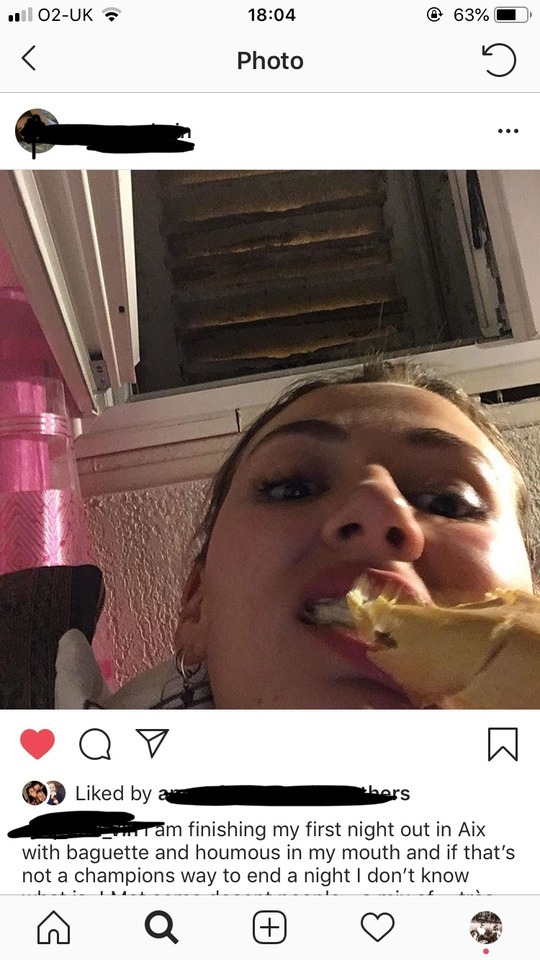Don't wanna be here? Send us removal request.
Text
Evaluation
For this module I decided to explore the relationship between social media and identity, specifically focussing on people in ‘Generation Z’. I focussed on this particular age group as 91% of 16-24 year-olds use the internet for social media. Young people on social media are overloaded with information, as there is a constant stream of photos and videos being posted to our feeds, which is instantly available whenever we want it. Furthermore, it is between these ages where we start to question our identity most, as it is a crucial time in our lives for making decisions that will shape our future, mostly concerning our studies and careers. We therefore begin to explore what it is that we are interested in and what makes us happy, and how we can project this to the rest of the world in order to attract certain opportunities into our lives.
Social media allows us to fabricate existing or invent new identities for ourselves. Whilst this can be freeing, to escape reality and become someone we aspire to be, many young people can’t help but compare themselves to others online which leads to low self-esteem. This occurs because most social media accounts only show the highlights of our lives, skipping over reality and the boring, mundane parts. I therefore decided to create my own Instagram account (@hiddenidentities_) where I have been posting an ongoing number of short videos. In the videos I am asking individuals who fall in the 16-24 year-old age group to “tell me something you’ve never told anyone else before” and film their response. The aim of the page is to expose the parts of our lives that we choose to keep hidden from our followers on social media, trying to reveal the truest versions of ourselves with #nofilter, creating a positive and refreshing online environment.
Ideally, I would have preferred to of had more posts on my Instagram page and more views/likes/followers but given the time frame and also having joined the course three weeks late I am happy with the content posted and like the direction in which the account is heading. The posts are slowly getting more views and responses which is having a direct growth in my confidence to approach and ask strangers in public. I have found that I am most interested in the responses I get from strangers as I do not know their identities at all, so cannot tell if what they are telling me is true or false, and if their response is truly a hidden part of their identity.If I had more time I would definitely dedicate more days to standing in the street and asking strangers. I would like to continue with this project and keep posting on the Instagram as I see room for expanding the idea and taking the page a bit further by experimenting with other social media platforms and asking people from more areas of the country, in order to get a wider range of backgrounds.
0 notes
Link
0 notes
Link
0 notes
Link
0 notes
Video
tumblr
The commute home
Showing the mundane parts of my life, which I choose not to show on social media
0 notes
Video
tumblr
Another video showing mundane parts of my day and life that doesn’t get shown on social media
0 notes
Video
tumblr
Endless Scrolling
Another video showing the mundane parts of my day that I don’t show on social media
0 notes
Quote
Managing your online identity, and thus reputation, is hardly a niche activity. Whether you're audition you CV on LinkedIn or untagging unflattering pictures posted on Facebook, we're all making, often daily, decisions about how we want to project ourselves. In the same way we worry about looking good on paper, we want to look good on-screen too. On the whole, we emphasise our abilities, downplay anything that could cast aspersions on our character and try, at all costs, to project an image of success
Why Social Media is Ruining Your Life, Katherine Ormerod
0 notes
Video
youtube
Social Media: The Double Edged Sword, Danya Bashir TED Talk
0 notes
Video
youtube
Erving Goffman, a Canadian-American sociologist, social psychologist and writer, uses the imagery of the theatre in order to portray the importance of human social interaction.
He believed that when an individual comes in contact with other people, that individual will attempt to control or guide the impression that others might make of him by changing or fixing his or her setting, appearance and manner.
Social media platforms can be described as the stage in which we are performing our different identities
0 notes
Video
youtube
How Social Media Shapes Identity, Ulrike Schultze TED Talk
0 notes
Quote
The more we accept that digital identities are simply simulations rather than true benchmarks from which to judge our true position in life, the kinder we can be to ourselves. The time is nigh to stop battering ourselves with comparisons to others which just don’t exist.
Why Social Media is Ruining Your Life by Katherine Ormerod
0 notes
Link
“Social media offer new opportunities for sharing self-presentational content, or “branding”oneself online.”
“Selective self-presentation refers to the fact that individuals can choose which identity cues they claim in online environments. The ability to share only the cues that one wants others to have, thus curating a desired impression, is enabled by two characteristics of CMC: asynchronicity and reduced cues.”
“Users who viewothers’ social media content may encounter feelings of inadequacy or lowered self-esteem when comparing themselves to the uniformly positive and self-promotional boasting of their peers, consistent with social comparison theory’s premise that the social attractiveness of others impacts perceptions of one’s own social attractiveness (Festinger, 1954).”
0 notes
Link
0 notes
Link
0 notes
Photo


An example of a “Rinsta” (real Instagram) vs. a “Finsta” (fake/fun Instagram)
0 notes